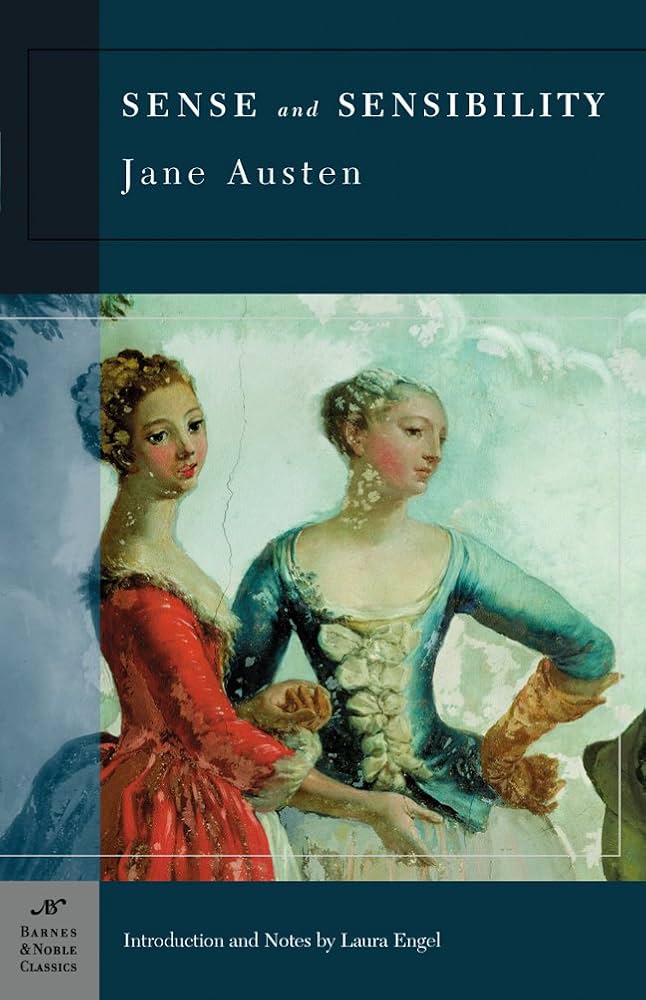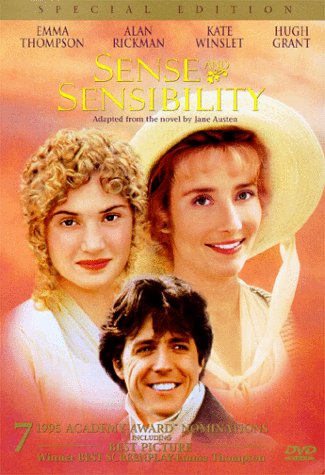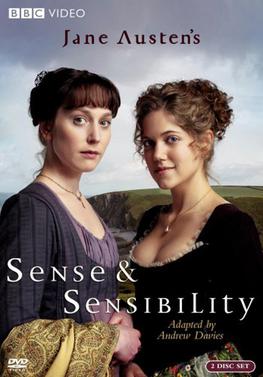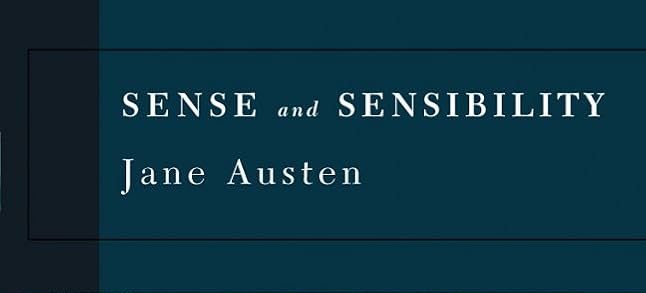When I first read Sense and Sensibility for a high school English class, I declared it “harder to understand than Shakespeare.” This was a grandiose statement bolstered by my adoration of Shakespeare and my inexperience with Jane Austen – and one I certainly don’t want to be held to!

In my first reading of S&S, I remember being disappointed by the unfolding of Elinor and Marianne’s romances. While I liked their sisterly bond and the differences in their temperaments, I decided that Edward had inappropriately flirted with Elinor despite being engaged. In my eyes, Colonel Brandon was a much better match for Elinor, and I was hoping for that outcome right up until Edward’s proposal.
In retrospect (and in my first rereading of the novel), I understand why I came to these conclusions. Unlike Pride and Prejudice, in S&S we never see Elinor and Edward falling in love. We are simply told this through narration, leaving little real investment in their relationship. We get a touch more from Marianne and Colonel Brandon through his initial compliment on her piano playing, but the ending of the novel implies she only marries him out of obligation and eventually comes around to loving him. Not really a romance for the ages, is it?
But it was through the film adaptations of S&S that I came to adore both of these pairings. I watched the BBC series twice through and developed a new appreciation for each romance. It really did come from having more scenes of the sisters falling for their respective suitors, as well as more impactful endings from Edward and Colonel Brandon both.
So, years later, here I am picking up the book again and getting the DVDs for my three favorite adaptations. Two of these, the ones I devoured back in high school, are sweet comfort films. But as for the one I hadn’t seen before…
Sense and Sensibility (1995)

… yeah. Arguably the most famous movie, and I hadn’t watched it until this year!
1995’s adaptation won the Academy Award for Best Adapted Screenplay, courtesy of Emma Thompson, who also plays Elinor Dashwood. She’s only one member of the star-studded cast, featuring Kate Winslet as Elinor, Hugh Grant as Edward, and Alan Rickman as Colonel Brandon. We also had Imogen Stubbs as Lucy Steele, who I eagerly recognized as Viola from 1996’s Twelfth Night!
This movie brilliantly portrays the sisterly bond between Elinor and Marianne. Also, more agency and characterization is given to their younger sister Margaret, with her beloved atlas. In this fleshing-out of Margaret, Edward is allowed a greater chance to shine. He declines to take Mrs. Dashwood’s room upon visiting, shields Margaret from Fanny in the library, and engages in an amusing back-and-forth with Elinor to draw Margaret from her hiding place.
In these moments, Edward is given more depth and personality than Austen granted him. Hugh Grant’s awkward, stuttering performance is wonderfully endearing if not a bit frustrating. And then there’s the scene where Lucy is smugly telling Elinor that Edward will be sure to visit her soon, only for her to hear the announcement that Edward has arrived to visit Elinor. The beautiful framing of Edward hurrying, ready to pour out his heart to Elinor without noticing Lucy at first… oh, I’m swooning.
The interaction between Edward and Elinor, where Elinor reveals to Edward that Colonel Brandon has offered him a parish, is also heavy with the pair’s unspoken feelings and tangible romance tension. This makes Elinor’s explosion of emotion before her proposal all the more pronounced.
I found two deleted scenes from this movie on my DVD. One of them takes place following the supposed reveal of Edward and Lucy’s marriage, with Mrs. Dashwood following Elinor outside. I very much liked how Mrs. Dashwood apologizes to Elinor for having always put so much on her within their family. Elinor is somewhat parentified in the book (and most adaptations), having to be the logical and reasonable one following the death of her father. So this exchange spoke to me.
As for the other deleted scene… look, I understand why they cut it. I get how having Elinor’s proposal stand on its own is more impactful. My mom and I were both in tears! But… my god, I don’t think a single word has ever melted me as much as “Do.”
As for Marianne’s side of things, her romance is also given greater depth than the novel. That first scene where Colonel Brandon stands in the doorway, caught by Marianne’s singing and her piano playing… you can just watch him fall!
For Marianne, however, her love story begins when Willoughby rescues her in the rain and quotes Shakespeare to her. He moves fast and passionately, loudly decrying Colonel Brandon at every opportunity. When Colonel Brandon receives an unknown letter and instantly runs for his horse, declaring that he cannot be delayed from his goal by an hour, Willoughby laughs and claims that Colonel Brandon can’t stand a good time. Marianne quickly agrees with him, earning Willoughby’s approval and Elinor’s wariness.
As the story goes, Willoughby’s expected proposal ends with his possibly permanent severance from the Dashwoods. After going months without any news, Marianne spies him at a party and shouts his name across the room. In the wake of his cold distance and emotionless letter, Colonel Brandon finally reveals the truth about Willoughby. Elinor, learning of Willoughby’s treatment of Eliza, passes this information along to Marianne.
Marianne, though beginning to heal, runs through the rain and tearfully quotes the Shakespeare sonnet Willoughby once told her. Her rescue by Colonel Brandon and subsequent illness result in him begging Elinor for some way he can help. He rides off to fetch Mrs. Dashwood, and Elinor holds her sister’s hand and tearfully asks her not to leave her alone.
This final scene made Elinor and Marianne’s relationship shine with emotion. But I was surprised by the exclusion of one of the most significant moments in S&S – Willoughby’s arrival. In the book, Willoughby tells Elinor he was in love with Marianne but had to marry Sophia Grey for her money. It made sense, though, that this scene could be cut. In their earlier dialogue, Colonel Brandon told Elinor he believed Willoughby loved Marianne but loved his security more. This explanation of his behavior, paired with the last shot of him wistfully looking down at Barton from afar, makes Willoughby’s ending hurt him as much as he deserves. If he only pretended at Elinor’s feelings, he’d be a cad who’d enjoy moving on to his next conquest. But with his feelings for Elinor being just as real as hers, he’s left to live knowing he lost the only woman he ever really loved.
Marianne’s gratitude toward Colonel Brandon and his poetry reading to her gives them a wonderful romantic ending leading to a joint wedding. It shines with true satisfaction and happiness from both couples with an emotion Jane Austen didn’t quite match.
This movie consists of a paired-down cast of characters, making the storyline flow quickly and concisely. (And you can say “Look, it’s Umbridge! And House!”) With enough time to invest in the characters and love stories, S&S is a sweeping, delicious romance sure to delight all Austen fans.
BBC’s Sense & Sensibility (2008)

God, I love this miniseries. It’s three hours long, making it only 50% longer than the 1995 film, but the character list is a good deal more detailed. Characters such as Lady Middleton and Anne Steele make the cut this time around, lending to a more full and bustling Barton Park.
This S&S opens with a scene of a young girl being seduced by an unseen man who beds her and promises to return. We eventually learn that this girl is Colonel Brandon’s Eliza, seduced by Willoughby and left pregnant with his child. The inclusion of Eliza as an on-screen character is a welcome addition, as we see both the result of Willoughby’s actions and Colonel Brandon’s kindness and protection towards his ward.
As in 1995, John Dashwood is still a spineless asshole who cedes to Fanny’s every wish. Their child, Henry, serves to heighten their distastefulness when paired with Margaret’s frustrations with him. In their behavior, Edward shines upon his arrival. He is courteous to the Dashwoods and respects Mrs. Dashwood as mistress of Norland. Hugh Grant’s hiding Margaret from Fanny in 1995 is echoed here as Edward encourages Fanny to leave the library unaltered and winks at Margaret from her reading corner. This interaction, in addition to Edward giving Margaret a ride on his horse, endears him greatly to Elinor. And, as with Elinor making farewell gifts for their former servants in the 1995 version, Elinor of 2008 shows kindness to them by telling the maids there is no need to reclean the rugs for Edward’s arrival.
Margaret is given a greater role in here, complaining to her mother that being a girl means you have to “sit around and wait for things to happen” and declaring that if she were a boy she’d kill Willoughby with her sword. Surprisingly, Mrs. Dashwood also has more to do this time around. In the book, she is as emotional and sentimental as Marianne, leaving Elinor to be the practical one. This is reflected in Elinor being the only one to see reason when the family is looking into new living situations, but Mrs. Dashwood also gets a chance to mourn what she has lost. When Willoughby leaves Marianne, Mrs. Dashwood insists that if she were still mistress of Norton, “[her] girls would never be treated like this.” She also has a deeper relationship with all three of her children, well-illustrated and powerfully felt.
I’ll praise 1995’s Edward-Elinor-Lucy scene all day long, but I’ll still swoon the most for the 2008 version. Instead of a tense, prolonged moment where Edward doesn’t notice Lucy at first, in 2008 Edward runs into the room, grabs Elinor’s hands, and uses her Christian name in a desperate voice before Elinor forces herself to tear her hands away under Lucy’s hawk-like stare.
2008 also gave us the infamous “cutting firewood in the rain” scene, just in case Edward’s gorgeous face wasn’t doing enough for you! Did I mention how much I love this version?
And oh man, that proposal scene! It doesn’t quite have a leg up on the 1995 one, but at least this time around we hear “Will you marry me?” in the most wondrous, hopeful tone… oh, I’m weak.
Anyway. Ahem. Let’s focus on the other romance, shall we?
As with 1995, the 2008 miniseries gives us much more to Marianne and Colonel Brandon than Austen ever did. 1995 captured all of Colonel Brandon’s longing for Marianne in the doorway scene, but 2008 gives the two of them a slightly more contenuous meet cute. Talking to Elinor, Colonel Brandon subtly compares Marianne playing piano to his first love, Eliza, and compliments her music in a way that feels backhanded. He goes on to gift Marianne complicated song sheets and flowers, but Marianne tells her family he’s too old for her. She escapes from his visit by running into the rain with Margaret, only to injure her ankle and be rescued by – who else? – Willoughby.
Willoughby and Marianne’s romance has the beginning of fairy tales, leaving Marianne tumbling head over heels for him – despite the obvious tension between him and Colonel Brandon. The latter’s receival of Eliza’s whereabouts is, in my humble opinion, significantly worse than Alan Rickman’s portrayal. In 1995, he ran the second he opened the letter, leaping onto his horse and riding off midsentence. In 2008, he simply looked at the letter and said “I have to leave” without any sort of rush. The intensity of 1995 is completely lost.
As for his and Marianne’s love story, the two of them have far more scenes than the book. He outright asks Willoughby what his intentions are with Marianne, for one. And when Willoughby rebuffs Marianne at the ball, Colonel Brandon catches her when she swoons. The duel between himself and Willoughby, mentioned in a single line in the book, is given a full portrayal. Colonel Brandon is the victor, but he walks away without harming Willoughby further.
Following Willoughby’s dismissive letter, Marianne sinks into despair, slowly rebuilding herself with the aid of Elinor and Colonel Brandon’s story about Eliza. She makes some progress but eventually runs out into the rain, starved for happy memories of Willoughby. This time, however, as in 1995, it is Colonel Brandon who comes to her rescue. The music in this scene, the romance… it’s gorgeous.
As the story goes, Marianne falls dangerously ill and Colonel Brandon volunteers to bring her mother to her. But this miniseries includes a scene from the book that wasn’t in the 1995 film: Willoughby’s surprise arrival upon hearing about Marianne. In here, Elinor is even harsher to him than she was in the book, coldly refusing to see him and insisting he doesn’t care for Marianne at all. Willoughby tries to refute this, arguing that he had to spur Marianne for the sake of his future. He then goes on to claim that his new wife dictated his letter and – wait for it – that Elinor heard a biased account of his treatment of Eliza. He all but says “She came onto me.” Right, like that justifies your behavior, creep!
Willoughby’s desperation is palpable, however, and entirely visible to Marianne, who secretly observes this exchange. Elinor kicks him out, leaving Marianne with this new knowledge. But she does not regress, instead telling Elinor that she now sees Colonel Brandon as the true romantic who cared so much for his first love. When she confides in Elinor that she has accepted his marriage proposal, Elinor cautiously advises her not to marry Colonel Brandon out of obligation or gratitude. But Marianne insists that, in her time with him, she has come to truly love him. It’s a wonderfully sweet scene, especially with Marianne being so wary of hurting Elinor’s feelings through finding her own happiness. The sisters’ relationship here is strong and emotional, leading to true satisfaction when they’re both able to claim happy endings!
I have such a deep love for this miniseries, born of both nostalgia and swoon-worthy romance. But this isn’t the only S&S adaptation to hold a special place in my heart…
From Prada to Nada (2011)

Oh geez, has it really been 14 years?
I discovered this movie alongside the BBC miniseries back in high school. It’s a fun S&S-based romcom with a Mexican twist. When I first got this DVD out of the library, I watched it twice in one week before forcing it on my family! Rewatching it with my mom for the fourth time was such a great blast to the past.
From Prada to Nada features Nora and Mary Dominguez, two sisters who couldn’t be more different. Nora is focused on becoming a lawyer and ignoring boys, whereas Mary enjoys blowing off school and going on shopping sprees with their father’s credit card. But when their father suddenly dies, the girls are introduced to Gabe, the older half-brother they never knew existed – whose name comes first on the will. Left without other options, the sisters are forced to move in with their aunts on the other side of LA.
For a 2011 “chick flick,” this movie gets a surprising amount of S&S details right. As in the book, their brother’s wife insists on remodeling their home. The girls downsize and move in with their aunts, and their personalities perfectly fit a modern retelling of S&S.
Nora, the older and more practical sister, is determined to start a pro-bono law practice. She is hired by Edward, the brother of Gabe’s terrible wife. Despite the attraction between herself and Edward, Nora refuses to consider dating him. After a cute but angsty first kiss, Nora rebuffs him for good, driving him to a hasty engagement with Lucy, a friend of his sister. Nora’s honest confession at his engagement party leads him to purchase a house near Nora’s aunts and offer her a diamond ring instead, paving the way for them to start their law practice together!
In modern times, Elinor Dashwood would certainly be a “career woman.” She’s level-headed, smart, and compassionate. Nora and Edward’s teamwork in winning an unemployment case for a discriminated family and their eventual business perfectly mirrors Elinor and Edward’s literary future in the church. It’s a job focused on helping people, not making money.
As for Mary, her adventure is the stuff of romcom delight. Her fascination and whirlwind romance with Rodrigo, her English TA, has all the red flags Willoughby always brings to the table. He starts off acting sweet and understanding, but a surprise vacation with no cell service and an extended arrival date? Yikes.
While Mary pursues the guy she thinks will give her back her old life, she gains a new admirer: Bruno, the young man heavily approved of by her aunts. (He’s portrayed by Wilmer Valderrama, who I knew vaguely as “that guy from Mom’s NCIS show,” so it was fun to recognize him during my fourth watch-through!) Bruno is surprisingly sweet: he fixes her car mirror, stands up for her against others, and challenges her to explore her Mexican identity. These two have the cutest scenes – anytime either of them shows up with a bird of paradise flower, I’m melting.
Also, after the party where Nora shoots down Edward and Bruno walks away from Mary, the former two have a nice little interaction. Bruno says “Sometimes you play a game even when you know you’re gonna lose” and Nora responds with “And sometimes you leave a game even when you know you could win.” Bruno tells her he wouldn’t leave a game like that, and the two share a drink. Colonel Brandon and Elinor have such a nice friendship in S&S, and I loved getting a snippet of that here!
While watching this movie, I couldn’t help wishing that Eliza had made it to this adaptation. Having Bruno raising the daughter of his ex-girlfriend would be a nice addition, but I won’t get greedy.
As for Rodrigo, his reveal is somehow worse than Willoughby’s textual actions toward Marianne. When Marianne discovers him at her brother’s party, having returned to LA without telling her, she is introduced to his wife. Marianne leaves, distraught, and gets into a bad car accident. Upon recovering with the help of her aunts, she returns home, where Bruno has built a ramp for her wheelchair. And then the two of them finally get together. It’s a slow burn that’s well worth the wait!
In this adaptation, we don’t have Rodrigo rushing to Mary’s bedside or insisting on his love for her. And honestly, that fits much better here! There isn’t enough room for Willoughby’s entire messy arc, even if it deprives us of some sweet schadenfreude. This way, the path is made clear for Mary and Bruno to reach their happy ending!
This movie’s exclusion of Margaret and Mrs. Dashwood made sense, as their presences would’ve muddied the water: Margaret serves no real purpose in the book, and a modern-day Mrs. Dashwood would be more likely to inherit her husband’s estate rather than his son. But there’s one character who is given a complete makeover, quickly becoming my favorite part of the movie: Gabe, Nora and Mary’s surprise brother.
In the book and every movie, John Dashwood is absolutely awful. He’s not as openly antagonistic as Fanny, but he bends to her every whim and refuses to stand up for himself or support his family as his father so clearly intended. From Prada to Nada, however, gives Gabe a surprisingly deep backstory. He never met his father, whose letters never reached his illegitimate son. Gabe is more sympathetic to his sisters than John ever was, even showing up at the hospital when Mary is injured after she brought him their father’s letters. He also brings a lovely piece of news: he broke up with his wife!
In the final scene of this movie, with Nora and Edward getting married, Gabe is present with the entire family. It’s a wonderful ending with the siblings become true friends instead of remaining opposed!
Ah, S&S, I love you so. There isn’t a Jane Austen work out there I dislike (although I’ve yet to exhaust her library), but this one is so very special to me. And it has such a rich trove of adaptations to enjoy! I recommend every single one on this list. They each satisfy a particular itch for me. From now on, I don’t think I can ever watch any of them without the others!


